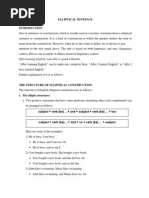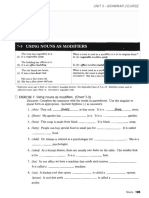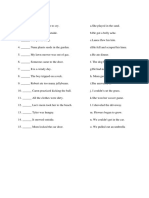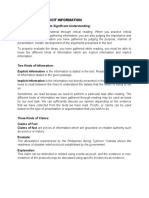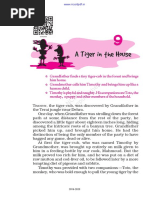100%(1)100% found this document useful (1 vote)
813 viewsUnit 1 Basic English Sentence Patterns Exercise 1
Unit 1 Basic English Sentence Patterns Exercise 1
Uploaded by
Hải Anh VũThis document contains exercises from an English grammar workbook. It includes exercises to rearrange words into sentences, identify parts of speech like nouns, verbs, adjectives within sentences, and identify other elements like pronouns, prepositions, conjunctions and exclamations. The exercises provide examples and instructions for learners to practice and reinforce their understanding of basic English sentence patterns and grammar.
Copyright:
© All Rights Reserved
Available Formats
Download as DOCX, PDF, TXT or read online from Scribd
Unit 1 Basic English Sentence Patterns Exercise 1
Unit 1 Basic English Sentence Patterns Exercise 1
Uploaded by
Hải Anh Vũ100%(1)100% found this document useful (1 vote)
813 views4 pagesThis document contains exercises from an English grammar workbook. It includes exercises to rearrange words into sentences, identify parts of speech like nouns, verbs, adjectives within sentences, and identify other elements like pronouns, prepositions, conjunctions and exclamations. The exercises provide examples and instructions for learners to practice and reinforce their understanding of basic English sentence patterns and grammar.
Original Title
Unit 1
Copyright
© © All Rights Reserved
Available Formats
DOCX, PDF, TXT or read online from Scribd
Share this document
Did you find this document useful?
Is this content inappropriate?
This document contains exercises from an English grammar workbook. It includes exercises to rearrange words into sentences, identify parts of speech like nouns, verbs, adjectives within sentences, and identify other elements like pronouns, prepositions, conjunctions and exclamations. The exercises provide examples and instructions for learners to practice and reinforce their understanding of basic English sentence patterns and grammar.
Copyright:
© All Rights Reserved
Available Formats
Download as DOCX, PDF, TXT or read online from Scribd
Download as docx, pdf, or txt
100%(1)100% found this document useful (1 vote)
813 views4 pagesUnit 1 Basic English Sentence Patterns Exercise 1
Unit 1 Basic English Sentence Patterns Exercise 1
Uploaded by
Hải Anh VũThis document contains exercises from an English grammar workbook. It includes exercises to rearrange words into sentences, identify parts of speech like nouns, verbs, adjectives within sentences, and identify other elements like pronouns, prepositions, conjunctions and exclamations. The exercises provide examples and instructions for learners to practice and reinforce their understanding of basic English sentence patterns and grammar.
Copyright:
© All Rights Reserved
Available Formats
Download as DOCX, PDF, TXT or read online from Scribd
Download as docx, pdf, or txt
You are on page 1of 4
Unit 1
Basic English Sentence Patterns
Exercise 1
Rearrange the words in correct order to make complete sentences.
e.g. the fat cat / a mouse / is chasing. The fat cat is chasing a mouse.
1. that thin girl / is drinking / milk now. That thin girl is drinking milk now.
2. the robbers yesterday / the police / caught. The police caught the robber yesterday.
3. our teacher / like /we. We like our teacher.
4. my mother / my baby sister / is looking after. My mother is looking after my baby sister.
5. has just written / a letter / the tall man. That tall man has just written a letter.
6. the students / have solved / some Mathematics problems.
The students have solved some Mathematics problems.
7. her aunt tomorrow / will visit / Mary. Mary will visit her aunt tomorrow.
8. newspapers every day / my boss / reads. My boss reads newspapers every day.
9. enjoyed / the movie / the audience. The audience enjoyed the movie.
10. the cook / some chocolate cakes / has made. The cook has made some chocolates.
Exercise 2
Rearrange the words in correct order to make complete sentences.
e.g. my sister / a birthday cake yesterday / me / baked My sister baked me a birthday cake
yesterday.
1. the short man / has bought / some crayons from the stationery shop / his son
The short man has bought his son some crayons from the stationery shop
2. the policeman / has just shown / the driver / his driving license
The driver has just shown the policeman his driving license.
3. the patient / gave / some medicine / the nurse
The nurse gave the patient some medicine.
4. brought / me / a bouquet of flowers last week / my uncle
My uncle brought me a bouquet of flowers last week.
5. the shopkeeper / the customer / is paying / two hundred dollars
The customer is paying the shopkeeper two hundred dollars.
6. he / his brother / the secret / has never told
He had never told his brother the secret.
7. a postcard from Japan / sent / her / her best friend
Her best friend set her a postcard from Japan.
8. did not lend / his new model car / the child / his classmate
The child did not lend his classmate his new model car.
9. her mother / cooked / her / some congee
Her mother cooked her some congee.
10. has ever given / any help / the blind woman / no one in the street
No one in the street has never given the blind women any help.
Exercise 3
Rewrite each of the following sentences by placing the word in brackets before the indirect
object.
e.g. My brother showed me his new wallet. (to) My brother showed his new wallet to me.
1. The postman took her a letter yesterday. (to)
The postman took a letter to her yesterday.
2. The dog owner gives his dog a bone every day. (to)
The dog owner gives a bone to his dog every day.
3. The students sent their teacher a present. (to)
The students sent a present to their teacher.
4. The gardener handed me some flowers. (to)
The gardener handed some flowers to me.
5. My mother has already taken my father a cup of coffee.(to)
My mother has already taken a cup of coffee to my father.
6. She found me a seat in the concert last Sunday. (for)
She found a seat for me in the concert last Sunday.
7. Betty has painted her best friend a beautiful picture. (for)
Betty has painted a beautiful picture for her best friend.
8. We bought our uncle a pair of gloves on his birthday. (for)
We bought a pair of gloves for our uncle on his birthday.
9. The tailor made the princess a new dress. (for)
The tailor made a new dress for the princess.
10. Judy has baked me some chocolate cookies. (for)
Judy has baked some chocolate cookies for me.
Unit 2 Parts of Speech
Exercise 1
Pick out the nouns in the following sentences. There may be more than one noun in each
sentence.
e.g. Terry told his friends many secrets. Nouns: Terry, friends, secrets
1. His success made his parents happy.
2. Cows give us milk.
3. The train has just left the station.
4. Paris is the capital of France.
5. Our family spent the holiday in London.
6. Do you drink coffee with milk and sugar?
7. Lead is softer than iron.
8. What’s more important, health or wealth?
9. A swarm of rabbits ran out of the forest.
10. My brother had a toothache last week.
Exercise 2
Pick out the pronouns in the following sentences. There may be more than one pronoun in each
sentence.
e.g. These socks are hers. pronoun: hers
1. The yellow car over there belongs to him.
2. This cat is beautiful, but mine is more beautiful.
3. Who gave her the money?
4. He cut himself when he was shaving.
5. Which do you prefer, an apple or an orange?
6. There is nobody here.
7. The teacher can hear them talking.
8. She explained it to me yesterday.
9. I found these tickets on the floor yesterday. Are they yours?
10. You should help yourself.
Exercise 3
Pick out the adjectives in the following sentences. There may be more than one adjective in each
sentence.
e.g. He is a hard-working student. adjective: hard-working
1. These apples are sweet but expensive.
2. Whose umbrella is this?
3. There is some milk in the refrigerator.
4. Tai Mo Shan is the highest mountain in Hong Kong.
5. We have not got any mango trees in our garden.
6. Which dress do you like, the blue one or the red one?
7. Peter is fatter than Maurice.
8. It is dangerous for children to play with matches.
9. This book is very interesting. Have you read it?
10. Alan is an honest boy.
Exercise 4
Pick out the verbs in the following sentences. There may be more than one verb in each sentence.
e.g. There are thirty students in my class. verb: are
1. After the rain had stopped, the children went out to the playground.
2. My sister enjoys listening to classical music.
3. We will visit the museum tomorrow.
4. Who has finished doing the exercise?
5. The tiger was shot by the hunter.
6. The train is leaving soon.
7. Snakes are found in Sai Kung.
8. John occupies a very important position in the company.
9. I was bathing when the telephone rang.
10. That is the woman who knows my parents.
Exercise 5
Pick out the adverbs in the following sentences. There may be more than one adverb in each
sentence.
e.g. The soldiers fought bravely in the war. adverb: bravely
1. The little girl smiled sweetly at me yesterday.
2. Please hang the wet clothes here.
3. The chairman seldom arrives on time.
4. You must spend your money more wisely.
5. It is raining heavily. You must drive carefully.
6. He shouted at the dog that was barking noisily.
7. Jane spoke the least throughout the meeting.
8. You must work hard if you want to pass the examination.
9. Have you ever visited Thailand?
10. The box is too heavy for him to carry.
Exercise 6
Pick out the prepositions in the following sentences. There may be more than one preposition in
each sentence.
e.g. My father works in a factory. . preposition: in
1. Take off your hat before you go into the room.
2. I bought this book for fifty dollars.
3. There is a bridge over the river.
4. I like walking along the riverbank.
5. She kept her jewellery in a box under the bed.
6. The lifeguard had to swim against the currents to reach the drowning child.
7. He is afraid of snakes.
8. Homework should be finished at home.
9. My parents do not work on Sundays.
10. Rose is absent from school today.
Exercise 7
Pick out the conjunctions in the following sentences.
e.g. A fish can swim but a bird cannot. . conjunction: but
1. Although he was late, he managed to catch the bus.
2. My father had locked the door before he went to bed last night.
3. I am dark but my sister is fair.
4. We must hurry or we will be late.
5. Do not move until the general gives the order.
6. Since she was not there, I talked to her husband.
7. They were disqualified because they cheated during the game.
8. We can’t carry on for it is raining heavily.
9. My brother had a serious stomachache, so he returned home.
10. Though she was suffering much pain, she did not complain.
Exercise 8
Pick out the exclamations in the following sentences.
e.g. Hush! Don’t make any noise. exclamation: Hush
1. Oh! I am sorry to hear that.
2. Ah! This is my dream car.
3. Hush! Be quiet. The baby is asleep.
4. How wonderful! It can fly.
5. Alas! The dog is dead.
6. Ha! Ha! I have won the first prize.
7. Good heavens! A storm is coming.
8. Dear me! What a fool he is.
9. Well done! Please play it once more.
10. Hurrah! Our team won the game.
You might also like
- Figurative LanguageDocument5 pagesFigurative LanguageMlynNo ratings yet
- Types of Sentences ExercisesDocument4 pagesTypes of Sentences ExercisesHamidah JamaludinNo ratings yet
- An Appeal To The Senses: The Development of The Braille System in Nineteenth-Century FranceDocument5 pagesAn Appeal To The Senses: The Development of The Braille System in Nineteenth-Century FranceGrlae100% (1)
- Two at A Time (Pronouns) : Per RefDocument2 pagesTwo at A Time (Pronouns) : Per RefANISA LIA AMOYELNo ratings yet
- The Unit of TranslationDocument14 pagesThe Unit of TranslationIlda PoshiNo ratings yet
- English Sentence Patterns PDFDocument117 pagesEnglish Sentence Patterns PDFsunkumar89% (9)
- Reading - Vocabulary ItemsDocument4 pagesReading - Vocabulary ItemsHải Anh VũNo ratings yet
- Structure Skill 5Document3 pagesStructure Skill 5api-262133173100% (1)
- Active and Passive VoiceDocument2 pagesActive and Passive VoiceBernadette NarteNo ratings yet
- TUGASDocument9 pagesTUGASFianNo ratings yet
- Figurative Language SampleDocument16 pagesFigurative Language Sampleshugy100% (1)
- Plagiarism - ZINEB KESSASSIDocument5 pagesPlagiarism - ZINEB KESSASSIblue lila100% (1)
- Anecdote TextDocument14 pagesAnecdote Textgusdul100% (1)
- Error Analysis Error Classifying (Types of Error: Ommision, Addition, Misformation and Misordering)Document11 pagesError Analysis Error Classifying (Types of Error: Ommision, Addition, Misformation and Misordering)Hana LestariNo ratings yet
- Adjective PhraseDocument9 pagesAdjective PhraseAndika R PutraNo ratings yet
- Exercises On Word Structure and Word FormationDocument16 pagesExercises On Word Structure and Word FormationHuyền ThuNo ratings yet
- Skimming News Stories and Magazine Articles: Exercise 5Document2 pagesSkimming News Stories and Magazine Articles: Exercise 5Ghina AnugrahNo ratings yet
- Discussion TextDocument8 pagesDiscussion Textadeliaaaaa100% (1)
- Adjective ClausesDocument11 pagesAdjective ClausesChristine NadyaNo ratings yet
- Guide 2.5Document28 pagesGuide 2.5danieoNo ratings yet
- A. MULTIPLE CHOICE (4.0 Points) Choose The Correct Answer: 1. Which of The Followings Is A True Clause?Document5 pagesA. MULTIPLE CHOICE (4.0 Points) Choose The Correct Answer: 1. Which of The Followings Is A True Clause?My Võ Hoàng100% (1)
- Elliptical SentenceDocument13 pagesElliptical SentencePutriAuliaRamadhaniNo ratings yet
- Lesson 7Document15 pagesLesson 7Edz SoretsellaBNo ratings yet
- Adverbial ClauseDocument19 pagesAdverbial ClauseAngga ArindraNo ratings yet
- Mini Research - Esp Course Design - Group DDocument33 pagesMini Research - Esp Course Design - Group DPutri IlsaNo ratings yet
- Paraphrasing ExercisesDocument2 pagesParaphrasing ExercisesYa Li100% (3)
- Parallel StructureDocument3 pagesParallel StructureastridNo ratings yet
- Articles About EducationDocument6 pagesArticles About EducationLIPSONNo ratings yet
- The Analysis of Intrinsic Elements in The Little Prince A Novel by Antoine de Saint ExuperyDocument17 pagesThe Analysis of Intrinsic Elements in The Little Prince A Novel by Antoine de Saint ExuperyKristina SimbolonNo ratings yet
- Parallelism PracticeDocument2 pagesParallelism PracticeHien Le0% (2)
- 907 - Conjunctions and Adverbial Clauses Advanced Level Mcqs Test With Answers 3Document5 pages907 - Conjunctions and Adverbial Clauses Advanced Level Mcqs Test With Answers 3ال زهرة100% (1)
- Exercise 7. Using Nouns As Modifiers. (Chart 7-3) : DirectionsDocument10 pagesExercise 7. Using Nouns As Modifiers. (Chart 7-3) : DirectionsDumitrita Tabacaru100% (1)
- Ninda AK ListeningDocument6 pagesNinda AK ListeningRois Jr.No ratings yet
- Academic Reading-Ass 4Document3 pagesAcademic Reading-Ass 4Nada NaldaNo ratings yet
- Proverb and RiddleDocument14 pagesProverb and RiddlelidiaNo ratings yet
- PEV - Day2Document5 pagesPEV - Day2sohamNo ratings yet
- Diagnostica InglesDocument3 pagesDiagnostica InglesValentina Baron de Arco100% (1)
- Bahasa Inggris Procedure TextDocument5 pagesBahasa Inggris Procedure TextRafiqah AzzahraNo ratings yet
- Workshop 3 Done in ClassDocument13 pagesWorkshop 3 Done in Classapi-269162555No ratings yet
- TEKS ExtracurricularDocument1 pageTEKS ExtracurricularPremium MeiNo ratings yet
- Chapter 9Document16 pagesChapter 9Weny Fitriana50% (4)
- Module 4 Lesson 1 Module 4 Lesson 1 Activity: A) SnowblossomDocument2 pagesModule 4 Lesson 1 Module 4 Lesson 1 Activity: A) Snowblossommae DamaNo ratings yet
- "Main Idea": Interesting Inventions 1. TopicDocument2 pages"Main Idea": Interesting Inventions 1. TopicRisma Wati0% (1)
- Cause EffectDocument7 pagesCause Effecttiwadak mandaiNo ratings yet
- Direct and Indirect Speech ExerciseDocument3 pagesDirect and Indirect Speech ExerciseAgnes Velasco0% (2)
- Adjective Clause PronounsDocument3 pagesAdjective Clause PronounsTaufiq Baskoro RNo ratings yet
- Compare and Contrast Essays 2Document6 pagesCompare and Contrast Essays 2rafabarajimNo ratings yet
- Cause and Effect TestDocument5 pagesCause and Effect TestCidAlexanderRami50% (2)
- Tugas BinggiDocument6 pagesTugas BinggiAmirah SyahranNo ratings yet
- Explicit and Implicit InformationDocument3 pagesExplicit and Implicit InformationIan Moniq AlcantaraNo ratings yet
- Bina Sarana Informatika Komisi Bahasa InggrisDocument83 pagesBina Sarana Informatika Komisi Bahasa Inggrissuci riyantiNo ratings yet
- Analytical and Hortatory ExpositionDocument2 pagesAnalytical and Hortatory ExpositionDewi Puspita SariNo ratings yet
- Pertemuan7 Hendra Ekky SaputraDocument6 pagesPertemuan7 Hendra Ekky SaputraHendra DevgruNo ratings yet
- Passive VoiceDocument13 pagesPassive VoiceAgustina GitaNo ratings yet
- Five Parts Personal LetterDocument1 pageFive Parts Personal LetterHasan BukhoriNo ratings yet
- Exercise4 (Page 54) : Do The Exercise 4 (Page 54) & Exercise 6 (Page 56) in Your Reading BookDocument2 pagesExercise4 (Page 54) : Do The Exercise 4 (Page 54) & Exercise 6 (Page 56) in Your Reading BookIvana Ayu0% (1)
- Cause and Effect PengayaanDocument5 pagesCause and Effect PengayaanLutvia AnggitaNo ratings yet
- ExercisesDocument8 pagesExercisesMammeri ElhachemiNo ratings yet
- Sentence Structure PracticeDocument83 pagesSentence Structure PracticeKU NOR SURIATI BINTI KU ISHAK KPM-GuruNo ratings yet
- English Grammar UsageDocument117 pagesEnglish Grammar UsageCariericacire MoNo ratings yet
- All SSC Exam E-BooksDocument117 pagesAll SSC Exam E-Booksjimcarryfromindia100% (1)
- Test 21 Listen To The Recording Twice Then Choose A, B or C To Best Answer The QuestionsDocument4 pagesTest 21 Listen To The Recording Twice Then Choose A, B or C To Best Answer The QuestionsHải Anh VũNo ratings yet
- Part 2-HandoutDocument3 pagesPart 2-HandoutHải Anh VũNo ratings yet
- I Enjoy Being The Boss of A Small Company. (FISH)Document3 pagesI Enjoy Being The Boss of A Small Company. (FISH)Hải Anh Vũ0% (1)
- MCQs Exercises - B1Document3 pagesMCQs Exercises - B1Hải Anh VũNo ratings yet
- Review Stress and VocabularyDocument5 pagesReview Stress and VocabularyHải Anh VũNo ratings yet
- Reading - Reference ItemsDocument5 pagesReading - Reference ItemsHải Anh Vũ100% (1)
- Night Courses in Computer Science. Another Way To Learn Is (9) Reading A Book. ThereDocument7 pagesNight Courses in Computer Science. Another Way To Learn Is (9) Reading A Book. ThereHải Anh VũNo ratings yet
- Reading-Detail, Negative and Scanning ItemsDocument4 pagesReading-Detail, Negative and Scanning ItemsHải Anh VũNo ratings yet
- Reading - Overview and Topics, Main IdeasDocument2 pagesReading - Overview and Topics, Main IdeasHải Anh VũNo ratings yet
- Gap Filling-1-HandoutDocument4 pagesGap Filling-1-HandoutHải Anh VũNo ratings yet
- Acfrogdnd4ryaxyqwm7zpsak4dlfbks83ppnvl8gwputw24g Sex6kxmzdf3wxfc6ab4iz Cvrrnkyynnabllj6nn2y2blfoyxmlbog03a8z1hdqjciqvrmzq9e001romvgn Pvtbdlejvb6xiajDocument6 pagesAcfrogdnd4ryaxyqwm7zpsak4dlfbks83ppnvl8gwputw24g Sex6kxmzdf3wxfc6ab4iz Cvrrnkyynnabllj6nn2y2blfoyxmlbog03a8z1hdqjciqvrmzq9e001romvgn Pvtbdlejvb6xiajHải Anh VũNo ratings yet
- Listening PET 6Document12 pagesListening PET 6Hải Anh VũNo ratings yet
- Latihan Soal Bahasa Inggris Pra Ujian MadrasahDocument11 pagesLatihan Soal Bahasa Inggris Pra Ujian MadrasahkhofifahisranurNo ratings yet
- English Lev 1 Workbook Answer KeyDocument6 pagesEnglish Lev 1 Workbook Answer KeyworldwideeduofficialNo ratings yet
- Learning Activity 1 A World of ImagesDocument4 pagesLearning Activity 1 A World of ImagesMaria Fernanda SantamariaNo ratings yet
- Play English Level 1 - Back To SchoolDocument9 pagesPlay English Level 1 - Back To SchoolMicky PNo ratings yet
- First Language Acquisition PDFDocument19 pagesFirst Language Acquisition PDFStiven AvilaNo ratings yet
- Pet and Domestic BirdsDocument2 pagesPet and Domestic BirdsJoyce FungNo ratings yet
- The Canine Chronicle 2Document420 pagesThe Canine Chronicle 2Chota Films and PhotographyNo ratings yet
- Pet Food Industry ReportDocument15 pagesPet Food Industry ReportChuck Achberger100% (1)
- Nouns Review PackDocument11 pagesNouns Review PackkirannainwalNo ratings yet
- Document 0 1527831453Document6 pagesDocument 0 1527831453ssahoo24643No ratings yet
- FREE SAMPLE of The Dog Breeders HandbookDocument23 pagesFREE SAMPLE of The Dog Breeders Handbookmutisov261No ratings yet
- Kim 18 - Era MelaniaDocument4 pagesKim 18 - Era MelaniaEra MelaniaNo ratings yet
- Subjects and PredicatesDocument18 pagesSubjects and PredicatesAna Paula Sanchez Mejorada de PaniaguaNo ratings yet
- Ngữ pháp tiếng anh lớp 3 UNIT 19Document7 pagesNgữ pháp tiếng anh lớp 3 UNIT 19Iosephus HuyNo ratings yet
- Basic English Language (Bel) : PretestDocument2 pagesBasic English Language (Bel) : PretestVia CioneloNo ratings yet
- Reading Journal Cheat SheetDocument2 pagesReading Journal Cheat SheetJoAnna GistandNo ratings yet
- Babylene - Short Stories With MoralDocument23 pagesBabylene - Short Stories With MoralBabylene GasparNo ratings yet
- Republic of The Philippines Province of Misamis Oriental Municipality of Villanueva Barangay Poblacion 3Document11 pagesRepublic of The Philippines Province of Misamis Oriental Municipality of Villanueva Barangay Poblacion 3Lovejoy DagasuhanNo ratings yet
- RECOVER-2024-Guidelines-Publication-Press-Release-06.26.2024Document2 pagesRECOVER-2024-Guidelines-Publication-Press-Release-06.26.2024vinicius.ferreira3No ratings yet
- Mowgli's BrothersDocument15 pagesMowgli's BrothersPaoLa LaraNo ratings yet
- Subject Verb AgreementDocument10 pagesSubject Verb Agreementsarasajed08No ratings yet
- Geah 109Document8 pagesGeah 109AhmedNo ratings yet
- 1098745-Immortal KombatDocument14 pages1098745-Immortal KombatDavid BobeNo ratings yet
- Reading ComprehensionDocument15 pagesReading Comprehension4c4yx4jknnNo ratings yet
- Fascinating Facts - Student's File - 1ST SemesterDocument36 pagesFascinating Facts - Student's File - 1ST Semesterconstantin.adriana.879No ratings yet
- Pre Level PRE LEVELDocument10 pagesPre Level PRE LEVELsara.hassan01No ratings yet
- Đề KT Unit 2 - Tiếng Anh 3 Smart Start - Đáp ÁnDocument5 pagesĐề KT Unit 2 - Tiếng Anh 3 Smart Start - Đáp ÁnNguyễn ThưNo ratings yet
- Soal B Ing PTS 1Document3 pagesSoal B Ing PTS 1vavaNo ratings yet
- Oxford Wordlist Desk ChartDocument2 pagesOxford Wordlist Desk ChartMaggie ChuNo ratings yet
- Mans Best Friend British English TeacherDocument11 pagesMans Best Friend British English TeacheraliciaismyteacherNo ratings yet





















